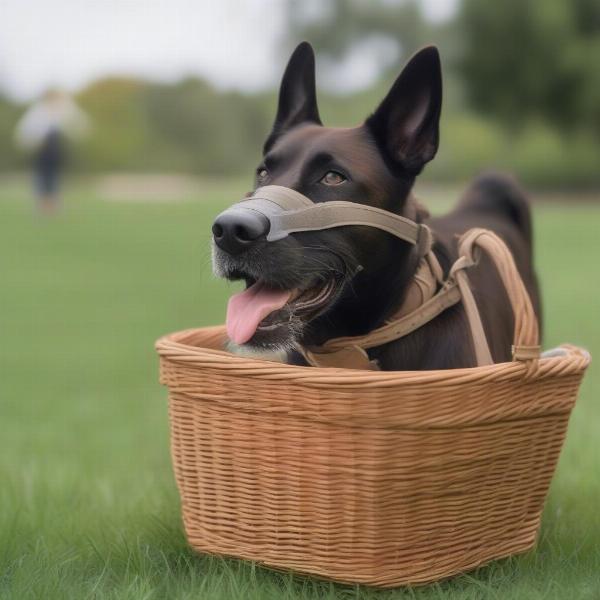Dogs, with their curious nature, often explore the world with their mouths. This can lead to unfortunate incidents, like eating bees. While a single bee sting usually isn’t a major concern, multiple stings or an allergic reaction can be dangerous. Knowing what to do if your dog eats a bee is crucial.
Understanding the Risks of Dogs Eating Bees
When a dog eats a bee, the most likely outcome is a sting inside the mouth, on the tongue, or in the throat. This can cause pain, swelling, and difficulty breathing. Severe allergic reactions, though less common, can be life-threatening and require immediate veterinary attention. Symptoms of an allergic reaction include facial swelling, hives, difficulty breathing, vomiting, and collapse.
What to Do If Your Dog Eats a Bee
If you suspect your dog ate a bee, monitor them closely for any signs of distress. If you see a stinger, try to remove it with a credit card or your fingernail, scraping it away rather than pinching. Applying a cold compress to the sting site can help reduce swelling and pain. Offer your dog small amounts of ice water to help soothe the area. If your dog shows signs of an allergic reaction, such as difficulty breathing or facial swelling, seek immediate veterinary care.
Preventing Bee Encounters in Dogs
While completely eliminating the risk is impossible, several strategies can minimize the chances of your dog encountering bees. Avoid walking your dog in areas known for bee activity, especially during peak foraging times. Keep your yard free of flowering plants that attract bees.  Dog wearing a muzzle for bee sting prevention Consider using a muzzle, particularly if your dog has a history of snapping at insects. Training your dog to leave bees alone can also be helpful.
Dog wearing a muzzle for bee sting prevention Consider using a muzzle, particularly if your dog has a history of snapping at insects. Training your dog to leave bees alone can also be helpful.
Recognizing Bee Sting Symptoms in Dogs
Knowing the signs of a bee sting is crucial for prompt action. Common symptoms include pawing at the mouth, whining, drooling, and swelling around the sting site. More serious signs include difficulty breathing, vomiting, and collapse, indicating an allergic reaction requiring immediate veterinary intervention.
Home Remedies for Mild Bee Stings in Dogs
For mild stings, home remedies can offer relief. A paste of baking soda and water can help neutralize the bee venom. Applying a cold compress can reduce swelling and pain. Over-the-counter antihistamines, such as diphenhydramine (Benadryl), may be given under veterinary guidance. Always consult your veterinarian before administering any medication to your dog.
When to Seek Veterinary Care for Bee Stings
If your dog experiences difficulty breathing, facial swelling, hives, vomiting, or collapse after a bee sting, seek immediate veterinary attention. These are signs of a potentially life-threatening allergic reaction. Even with mild stings, consult your vet if the swelling doesn’t subside within a day or two or if your dog seems excessively uncomfortable.
FAQ
- Can a bee sting kill a dog? Yes, multiple bee stings or an allergic reaction can be fatal.
- What are the signs of a bee sting allergy in dogs? Facial swelling, hives, difficulty breathing, vomiting, and collapse are common signs.
- Can I give my dog Benadryl for a bee sting? Consult your vet before giving your dog any medication, including Benadryl.
- How can I prevent my dog from eating bees? Avoid areas with high bee activity, keep your yard free of bee-attracting plants, and consider using a muzzle.
- How long does it take for a bee sting to heal in a dog? Mild stings usually heal within a few days.
- What should I do if the stinger is still in my dog? Try to remove it by scraping it away with a credit card or your fingernail.
- What if my dog eats a wasp instead of a bee? The treatment is similar to a bee sting. Monitor for signs of a reaction and contact your veterinarian if necessary.
Related Articles
ILM Dog is your trusted resource for expert dog care advice. We offer comprehensive information on dog breeds, health, training, nutrition, grooming, and much more. Our mission is to empower dog owners worldwide with the knowledge and resources they need to provide the best possible care for their canine companions. From puppy care to senior dog care, we cover all aspects of dog ownership. We also offer valuable insights on dog products and accessories. For expert advice and personalized support, contact us at contact@ilmdog.com or call us at +44 20-3965-8624. Visit ILM Dog for more information.